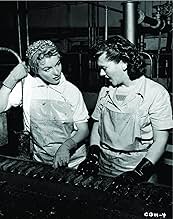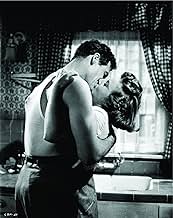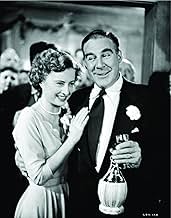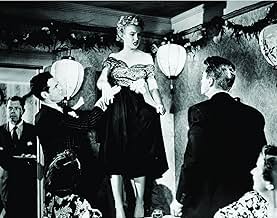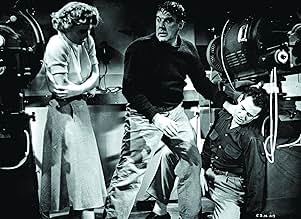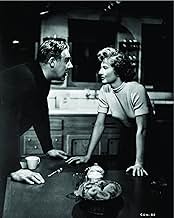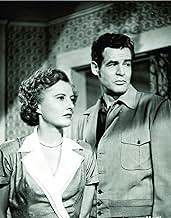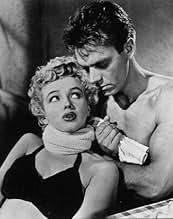AVALIAÇÃO DA IMDb
7,0/10
7,9 mil
SUA AVALIAÇÃO
Mae Doyle retorna à sua cidade natal como uma mulher cínica. Seu irmão Joe teme que sua amada, Peggy, funcionária da fábrica de conservas de peixe, possa acabar como Mae.Mae Doyle retorna à sua cidade natal como uma mulher cínica. Seu irmão Joe teme que sua amada, Peggy, funcionária da fábrica de conservas de peixe, possa acabar como Mae.Mae Doyle retorna à sua cidade natal como uma mulher cínica. Seu irmão Joe teme que sua amada, Peggy, funcionária da fábrica de conservas de peixe, possa acabar como Mae.
- Direção
- Roteiristas
- Artistas
- Prêmios
- 3 vitórias no total
William Bailey
- Waiter
- (não creditado)
Harry Baum
- Restaurant Patron
- (não creditado)
Dan Bernaducci
- Guest
- (não creditado)
Albert Cavens
- Restaurant Patron
- (não creditado)
Dick Cherney
- Fisherman
- (não creditado)
Charles Cirillo
- Restaurant Patron
- (não creditado)
Irene Crosby
- Guest
- (não creditado)
Russell Custer
- Fisherman
- (não creditado)
Tony Dante
- Fisherman
- (não creditado)
Roy Darmour
- Man
- (não creditado)
- Direção
- Roteiristas
- Elenco e equipe completos
- Produção, bilheteria e muito mais no IMDbPro
Avaliações em destaque
clash by night is a great example of what a difference great acting can make. those were the days! story is full of usual cliches, but stanwyck, paul douglas, robert ryan, and a young marilyn monroe: wow!!! and it shows how sexy a film can be without any "sex scenes" or even a hint of nudity.
Barbara Stanwyck is so good at playing rough-hewn women--characters with a cynical edge--that it's easy to take her presence here for granted. Once again, she's remarkably fine cast as a tough cookie returning to her hometown along the waterfront and eventually reuniting with her estranged brother. Meanwhile, Marilyn Monroe is fun as a sassy local girl (although her lines sound as if they were looped in post-production) and Paul Douglas is terrific as usual playing a lovestruck skipper. Tempestuous melodrama from director Fritz Lang is decent fare, with heated emotions and florid dialogue, but perhaps more subtlety and nuance would've made it a more memorable picture. **1/2 from ****
Far from vintage Fritz Lang, but still enjoyable in its high-strung melodramatic antics, accentuated in a needlessly symbolic way by the raging of the sea and the clouding over of the sky.
Tough girl Barbara Stanwyck returns to her hometown after ten years of being the mistress of a married man. "Home is where you come, when you run out of places", she says, characteristically". She meets and marries simple, goodhearted fisherman Paul Douglas, but is bored by ordinary married life: "Every day you get a little older, lonelier, stupider", and soon succumbs to her attraction to cynical, boozy movie projectionist Robert Ryan.
The power of 'Clash by Night' lies not in its trite plot or in its overblown imagery, but in the no-nonsense acting of Stanwyck and Ryan, tough as nails but raw at the core. They have an animal eroticism together between them that sparkles like fireworks, but they are also, alas, quite self-pitying.
Many of the bit parts are surprisingly unsavory, but then we also get the young Marilyn Monroe as the naive young girl who hopes to marry Stanwyck's hunky brother, played by Keith Andes, more often than not strutting his naked torso.
Tough girl Barbara Stanwyck returns to her hometown after ten years of being the mistress of a married man. "Home is where you come, when you run out of places", she says, characteristically". She meets and marries simple, goodhearted fisherman Paul Douglas, but is bored by ordinary married life: "Every day you get a little older, lonelier, stupider", and soon succumbs to her attraction to cynical, boozy movie projectionist Robert Ryan.
The power of 'Clash by Night' lies not in its trite plot or in its overblown imagery, but in the no-nonsense acting of Stanwyck and Ryan, tough as nails but raw at the core. They have an animal eroticism together between them that sparkles like fireworks, but they are also, alas, quite self-pitying.
Many of the bit parts are surprisingly unsavory, but then we also get the young Marilyn Monroe as the naive young girl who hopes to marry Stanwyck's hunky brother, played by Keith Andes, more often than not strutting his naked torso.
An utterly unflinching and engaging drama though not much entertainment for the masses , dealing with a wayward woman with a past , Mae Doyle (Barbara Stanwick), who comes back to her hometown and marries a good-natured , amiable fisherman (Paul Douglas) and subsequently has a baby . Her marriage is lucky but restless , then gravitating towards her deep wishes and Mae beds his best friend (the two-fisted but sensual Robert Ryan) . While , her brother Joe (Keith Andes) fears that his girlfriend , fish cannery worker Peggy (Marilyn Monroe), follows her steps and winds up like Mae. Beautifully Outspoken!". My Guy is Afraid to Marry Me!". They called it love! But that isn't what the whole town whispered...nor the ugly name the husband gave it when he found out...too late!. Livin' in my house! Lovin' another man! Is that what you call bein' honest?. That's just givin' it a nice name! .
This classic flick contains emotion , gritty realism, triangular drama , outstanding interpretations and atmospheric scenarios in black and white well photographed by great Nicholas Musuraca who along with John Alton and John Seitz are the essential cameramen of Film Noir. All of them make this a slice-of-life tragedy that lingers in the memory . Based on Clifford Odets play , it displays a seamy storyline that is exploited to the hilt by master director Fritz Lang . RKO film production put all the force of the screen into a challenging drama of furious passions and though there are pretty, excessive dialogues , it is entertaining enough . Barbara Stanwick provides another of her strong characterizations as an impulsive , cynical woman who marries good-tempered Jerry/Paul Douglas only to find herself drawn to Jerry's friend Earl , tough Robert Ryan . Resulting to be a psychological , dark drama about fatalism , duplicity , pessimism and human passions.
The motion picture was competently directed by Fritz Lang . This great German filmmaker Fritz Lang directed masterfully all kind of genres as Noir cinema , such as ¨Big heat¨ , ¨Scarlet Street¨ and ¨Beyond a reasonable doubt¨ , Epic as ¨Nibelungs¨, suspense and drama as ¨Secret beyond the door¨, ¨Clash by night¨ , Western as ¨Rancho Notorious¨ and ¨Return of Frank James¨ and, of course , Adventure as ¨Moonfleet¨ . This good drama ¨Clash by Night¨1952 with lots of exciting and thrilling moments will appeal to Barbara Stanwick , Marilyn Monroe and Robert Ryan fans . Rating : Better than average , turning out to be a marvellous stylised drama set at a coastal village . This movie is justly recommended as one of the spotlights of Hollywood´s efforts of the early Fifties . Worthwhile watching .
This classic flick contains emotion , gritty realism, triangular drama , outstanding interpretations and atmospheric scenarios in black and white well photographed by great Nicholas Musuraca who along with John Alton and John Seitz are the essential cameramen of Film Noir. All of them make this a slice-of-life tragedy that lingers in the memory . Based on Clifford Odets play , it displays a seamy storyline that is exploited to the hilt by master director Fritz Lang . RKO film production put all the force of the screen into a challenging drama of furious passions and though there are pretty, excessive dialogues , it is entertaining enough . Barbara Stanwick provides another of her strong characterizations as an impulsive , cynical woman who marries good-tempered Jerry/Paul Douglas only to find herself drawn to Jerry's friend Earl , tough Robert Ryan . Resulting to be a psychological , dark drama about fatalism , duplicity , pessimism and human passions.
The motion picture was competently directed by Fritz Lang . This great German filmmaker Fritz Lang directed masterfully all kind of genres as Noir cinema , such as ¨Big heat¨ , ¨Scarlet Street¨ and ¨Beyond a reasonable doubt¨ , Epic as ¨Nibelungs¨, suspense and drama as ¨Secret beyond the door¨, ¨Clash by night¨ , Western as ¨Rancho Notorious¨ and ¨Return of Frank James¨ and, of course , Adventure as ¨Moonfleet¨ . This good drama ¨Clash by Night¨1952 with lots of exciting and thrilling moments will appeal to Barbara Stanwick , Marilyn Monroe and Robert Ryan fans . Rating : Better than average , turning out to be a marvellous stylised drama set at a coastal village . This movie is justly recommended as one of the spotlights of Hollywood´s efforts of the early Fifties . Worthwhile watching .
Why did Fritz Lang want to make this movie? Did he select the cast? "Clash by Night" was part of the recent TCM tribute to Lang, and following after the early European masterpieces, "Metropolis," and "M," one wonders how much Lang modified and compromised his early filmmaking ideals and style in resettling in Hollywood and jockey for financial support. I've not seen or read the original Odets play on which the film is based, but whatever Lang's reason for choosing it, one has to ask how the finished movie fits into Lang's output, especially the stark, powerful, stylized early pieces. A couple of features stand out: Lang always had a message-- nothing was mere observation -- that shaped the plot and characters' motivations. If Good and Evil stand out too sharply in black and white terms, Lang is still intent on sharp analysis of the turns and twists on the road to Good or Evil. Forces beyond individual characters' control are harnessed and made part of the characters motivations. Then Lang sets them on their inevitable course, and we watch, sometimes in shock or agony.
In "Clash," the imagery-- contrasting shots of sea, clouds, birds,etc, register his endorsement of the natural order of things as Good. In Metropolis, the natural order of humanity toward others was stamped out by the drive for materialism and industrial supremacy, Evil (historically predicating Nazism), symbolized always by the grinding and spouting machinery. All of the characters are tuned to a high pitch and respond with intensity. Lang's style of directing brought out the extremes -- the fortissimos-- in his actors, no matter whom he cast. Lang must have been an extraordinarily demanding director to elicit such razor-edge performances from his actors.
The fact that all the actors in "Clash" are familiar to us from other films meant Lang had to pit them against each other to an even keener degree. They are all desperate for something, whether they reveal it on the surface or not. For an actress like Stanwyck, this was an easily achieved emotional state, and she had to accept the concept of "aging" in her role. If anything, Lang forced her to keep her hard edges up a bit too much, allowing some softening only in the rather quick ending. This bit of character transformation happens only after she sees the true desperation that she's driven Paul Douglas to in the final scene in the film room.
Ah, yes, the film room. If that isn't an obvious set piece, I don't know what is. Ryan, as the third wheel, runs the projectors. Much of his dialogue is double-edged. And Ryan's character is the most desperate, the least yielding, even to Stanwyck, making his profession as a film projectionist ironic and something artificial, compared to the "natural" metier of Douglas and his father's as fishermen. They draw on the bounty of nature and so symbolize -- purposely and obviously -- pure goodness in human nature. Douglas gives a generous, sweet-tough-guy performance that is Ryan's match. Douglas never guesses what temptation he presents to his wife Stanwyck when he casually invites his best friend to stay with them. This generosity extends in particular to his overlooking faults, whether of his leeching uncle or his friend's sarcstic selfishness.
The role of the father, as a link to the Old Country and its solid gold ways is well-placed. His speech at the wedding puts his character in a nutshell: God made love, God made wine, God made friends, let everyone enjoy them, or some such pithy message. For a filmmaker like Lang, and other transplanted Europeans, the sacrifice of deep roots of their heritage and language could only be compensated for by an equally deep absorption of the customs and values of the New Country. Emigré geniuses like Lang, Wilder, or von Stroheim, never left anything behind, they reabsorbed and refashioned their material through their sharp perception of human nature in this new context. I think that is why we feel this movie to be beyond mere melodrama. I couldn't stop watching it -- the characters caught me in their predicament: they reach a universal dimension in the very simplicity and obviousness of their situations and temptations. Lang's role was to push them to that level recognition in themselves.
Even the seemingly secondary characters like Stanwyck's brother and his girlfriend, the latter played surprisingly and delightfully by a young Marilyn Monroe, give strong performances. Marilyn already shows her subtlety and emotional vulnerability. Her spontaneous response to Stanwyck's return to her brother's apartment at the beginning revealed a genuine charm, and she provided a needed sparkle in this otherwise grim film.
So why see "Clash"? Even a secondary work by a master bears his mark, and to see the mark and its features in the context of film history is still a worthwhile effort.
Of Four ****, three ***.
In "Clash," the imagery-- contrasting shots of sea, clouds, birds,etc, register his endorsement of the natural order of things as Good. In Metropolis, the natural order of humanity toward others was stamped out by the drive for materialism and industrial supremacy, Evil (historically predicating Nazism), symbolized always by the grinding and spouting machinery. All of the characters are tuned to a high pitch and respond with intensity. Lang's style of directing brought out the extremes -- the fortissimos-- in his actors, no matter whom he cast. Lang must have been an extraordinarily demanding director to elicit such razor-edge performances from his actors.
The fact that all the actors in "Clash" are familiar to us from other films meant Lang had to pit them against each other to an even keener degree. They are all desperate for something, whether they reveal it on the surface or not. For an actress like Stanwyck, this was an easily achieved emotional state, and she had to accept the concept of "aging" in her role. If anything, Lang forced her to keep her hard edges up a bit too much, allowing some softening only in the rather quick ending. This bit of character transformation happens only after she sees the true desperation that she's driven Paul Douglas to in the final scene in the film room.
Ah, yes, the film room. If that isn't an obvious set piece, I don't know what is. Ryan, as the third wheel, runs the projectors. Much of his dialogue is double-edged. And Ryan's character is the most desperate, the least yielding, even to Stanwyck, making his profession as a film projectionist ironic and something artificial, compared to the "natural" metier of Douglas and his father's as fishermen. They draw on the bounty of nature and so symbolize -- purposely and obviously -- pure goodness in human nature. Douglas gives a generous, sweet-tough-guy performance that is Ryan's match. Douglas never guesses what temptation he presents to his wife Stanwyck when he casually invites his best friend to stay with them. This generosity extends in particular to his overlooking faults, whether of his leeching uncle or his friend's sarcstic selfishness.
The role of the father, as a link to the Old Country and its solid gold ways is well-placed. His speech at the wedding puts his character in a nutshell: God made love, God made wine, God made friends, let everyone enjoy them, or some such pithy message. For a filmmaker like Lang, and other transplanted Europeans, the sacrifice of deep roots of their heritage and language could only be compensated for by an equally deep absorption of the customs and values of the New Country. Emigré geniuses like Lang, Wilder, or von Stroheim, never left anything behind, they reabsorbed and refashioned their material through their sharp perception of human nature in this new context. I think that is why we feel this movie to be beyond mere melodrama. I couldn't stop watching it -- the characters caught me in their predicament: they reach a universal dimension in the very simplicity and obviousness of their situations and temptations. Lang's role was to push them to that level recognition in themselves.
Even the seemingly secondary characters like Stanwyck's brother and his girlfriend, the latter played surprisingly and delightfully by a young Marilyn Monroe, give strong performances. Marilyn already shows her subtlety and emotional vulnerability. Her spontaneous response to Stanwyck's return to her brother's apartment at the beginning revealed a genuine charm, and she provided a needed sparkle in this otherwise grim film.
So why see "Clash"? Even a secondary work by a master bears his mark, and to see the mark and its features in the context of film history is still a worthwhile effort.
Of Four ****, three ***.
Você sabia?
- CuriosidadesThis movie was shot while Barbara Stanwyck was in the process of divorcing Robert Taylor. The movie also features the rising young star Marilyn Monroe. Barbara gives a good performance in one of her most memorable films. Despite her emotional devastation due to the divorce, the crew noted Stanwyck's lack of a diva tantrum. Fritz Lang later said, "She's fantastic, unbelievable, and I liked her tremendously. When Marilyn missed her lines - which she did constantly - Barbara never said a word."
- Erros de gravaçãoWhile at the tavern, Mae and Jerry watch the moon rise over the ocean. The film takes place in Monterey, California, which is on the West coast, where the moon rises over the hills and sets on the ocean.
- Cenas durante ou pós-créditosand introducing Keith Andes
- ConexõesEdited into Les Amoureux du cinéma (1987)
- Trilhas sonorasI Hear a Rhapsody
Written by George Fragos (uncredited), Jack Baker (uncredited) and Dick Gasparre (uncredited)
Sung by Tony Martin
Principais escolhas
Faça login para avaliar e ver a lista de recomendações personalizadas
- How long is Clash by Night?Fornecido pela Alexa
Detalhes
Bilheteria
- Faturamento bruto mundial
- US$ 62
- Tempo de duração1 hora 45 minutos
- Cor
- Proporção
- 1.37 : 1
Contribua para esta página
Sugerir uma alteração ou adicionar conteúdo ausente



